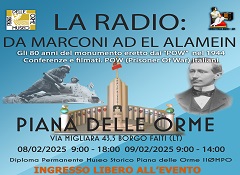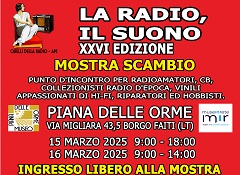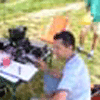ARISS contact planned Thursday June 26, 2014
Written by ON4WF
Sunday, 22 June 2014 07:52
An ARISS contact is planned Thursday June 26 at 12:08:49 UTC, which is 14:08:49 CEST. ESA astronaut Alexander Gerst KF5ONO will answer questions from students of Gymnasium Markt Indersdorf in Germany.
Signals from the ISS will be audible over Europe on 145.800 FM.
The grammar school/high school of Markt Indersdorf (Gymnasium Markt Indersdorf GMI, Germany) began operations in the school year of 2001/2002. In 2007 the first students graduated successfully with the certificate qualifying them to go to university (Abitur). Currently, about 90 teachers instruct approximately 1,100 pupils aged 10 to 19, about 250 of them are in the qualification phase (years/grades 11 and 12). The GMI offers the choice between two faculties, the linguistic and scientific-technological one. Approximately 75 percent of the pupils decide for the latter. The pupils obtain an education in science from the 5th year/grade on, the subject Physics is taught from year/grade 8 on for both faculties, in the scientific-technological profile additional hours for more in-depth education are mandatory. In years/grades 11 and 12, the pupils have the choice between Physics, Chemistry and Biology. Experience has shown that about 30 to 40 per school year decide to take Physics. About half of them vote for Astrophysics in the 12th year/grade. From 5th year/grade on, all pupils study English as their first foreign language.
The ISS project The pupils are divided for this project into different groups that are each responsible for one of the following activities:
- Technology: Installation, commissioning and maintenance of the antenna system respectively the radio station as well as all the necessary hardware and software
- Planning and monitoring: Organization of the overall sequence of events, initiation of a school\'s competition to select the questions to the astronauts, organization of rehearsals
- Presentation and documentation: Design of the facilities in question, elaboration of exhibitions and wall papers, construction of a model of the ISS, photo, audio and video documentation
- Public Relations (local and trans-regional): Press, TV, radio and website.
A large number of students and parents will be present in the Gymnasium’s hall to attend a live broadcast from the radio room. The contact will be conducted in German.
Participants will ask as many of the following questions as time allows:
1. (Julian, 14) Was hat Sie dazu bewegt Astronaut zu werden?
2. (Jakob, 16) Wie reagierte Ihre Familie auf den Plan ins Weltall zu fliegen?
3. (Daniel, 16) Wie oft gibt es Kontakt zu Familie und Freunden?
4. (Laura, 16) Was abgesehen von Ihrer Familie vermissen Sie am meisten?
5. (Rhea, 14) Welche persönlichen Dinge durften Sie auf die ISS mitnehmen?
6. (Mona, 16) Wie gehen Sie mit dem Zusammenleben mit Ihren Kollegen in dieser extremen räumlichen Enge um?
7. (Simon, 16) Was macht ein Astronaut in seiner Freizeit?
8. (Nathalie, 14) Wie fühlt man sich, wenn man auf die Erde herabschaut?
9. (Lisa-Marie, 16) Wie sieht ein Arbeitstag auf der ISS aus?
10. (Martina, 16) Welche Experimente führen Sie zur Zeit auf der ISS durch?
11. (Sybille, 16) Wie fliegen Insekten in der Schwerelosigkeit?
12. (Stephan, 12) Ist es möglich auf der ISS eine Kerze anzuzünden und sie brennen zu lassen? Wie sieht die Flamme dann aus?
13. (Tobias, 13) Welche Gefahren gibt es bei Außenarbeiten?
14. (Felix, 13) Wie fühlen Sie sich bei einem Aufenthalt außerhalb der ISS in ihrem Raumanzug?
15. (Louisa, 16) Gibt es nach langer Schwerelosigkeit gesundheitliche Schäden?
16. (Carina, 14) Wie wird die medizinische Versorgung auf der ISS gewährleistet?
17. (Florian, 15) Wie schmeckt Ihnen das Essen auf der ISS im Vergleich zum Essen auf der Erde?
18. (Lisa, 14) Was werden Sie als erstes machen wenn Sie wieder auf der Erde sind?
19. (Korbinian, 12) Welche Person ist Ihr größtes Vorbild?
20. (Laura, 16) Welche Voraussetzungen benötigt man, um Astronaut zu werden?
ARISS is an international educational outreach program partnering the participating space agencies, NASA, Russian Space Agency, ESA, CNES, JAXA, and CSA, with the AMSAT and IARU organizations from participating countries.
ARISS offers an opportunity for students to experience the excitement of Amateur Radio by talking directly with crewmembers onboard the International Space Station. Teachers, parents and communities see, first hand, how Amateur Radio and crewmembers on ISS can energize youngsters\' interest in science, technology and learning.
Sunday, 22 June 2014 07:52
An ARISS contact is planned Thursday June 26 at 12:08:49 UTC, which is 14:08:49 CEST. ESA astronaut Alexander Gerst KF5ONO will answer questions from students of Gymnasium Markt Indersdorf in Germany.
Signals from the ISS will be audible over Europe on 145.800 FM.
The grammar school/high school of Markt Indersdorf (Gymnasium Markt Indersdorf GMI, Germany) began operations in the school year of 2001/2002. In 2007 the first students graduated successfully with the certificate qualifying them to go to university (Abitur). Currently, about 90 teachers instruct approximately 1,100 pupils aged 10 to 19, about 250 of them are in the qualification phase (years/grades 11 and 12). The GMI offers the choice between two faculties, the linguistic and scientific-technological one. Approximately 75 percent of the pupils decide for the latter. The pupils obtain an education in science from the 5th year/grade on, the subject Physics is taught from year/grade 8 on for both faculties, in the scientific-technological profile additional hours for more in-depth education are mandatory. In years/grades 11 and 12, the pupils have the choice between Physics, Chemistry and Biology. Experience has shown that about 30 to 40 per school year decide to take Physics. About half of them vote for Astrophysics in the 12th year/grade. From 5th year/grade on, all pupils study English as their first foreign language.
The ISS project The pupils are divided for this project into different groups that are each responsible for one of the following activities:
- Technology: Installation, commissioning and maintenance of the antenna system respectively the radio station as well as all the necessary hardware and software
- Planning and monitoring: Organization of the overall sequence of events, initiation of a school\'s competition to select the questions to the astronauts, organization of rehearsals
- Presentation and documentation: Design of the facilities in question, elaboration of exhibitions and wall papers, construction of a model of the ISS, photo, audio and video documentation
- Public Relations (local and trans-regional): Press, TV, radio and website.
A large number of students and parents will be present in the Gymnasium’s hall to attend a live broadcast from the radio room. The contact will be conducted in German.
Participants will ask as many of the following questions as time allows:
1. (Julian, 14) Was hat Sie dazu bewegt Astronaut zu werden?
2. (Jakob, 16) Wie reagierte Ihre Familie auf den Plan ins Weltall zu fliegen?
3. (Daniel, 16) Wie oft gibt es Kontakt zu Familie und Freunden?
4. (Laura, 16) Was abgesehen von Ihrer Familie vermissen Sie am meisten?
5. (Rhea, 14) Welche persönlichen Dinge durften Sie auf die ISS mitnehmen?
6. (Mona, 16) Wie gehen Sie mit dem Zusammenleben mit Ihren Kollegen in dieser extremen räumlichen Enge um?
7. (Simon, 16) Was macht ein Astronaut in seiner Freizeit?
8. (Nathalie, 14) Wie fühlt man sich, wenn man auf die Erde herabschaut?
9. (Lisa-Marie, 16) Wie sieht ein Arbeitstag auf der ISS aus?
10. (Martina, 16) Welche Experimente führen Sie zur Zeit auf der ISS durch?
11. (Sybille, 16) Wie fliegen Insekten in der Schwerelosigkeit?
12. (Stephan, 12) Ist es möglich auf der ISS eine Kerze anzuzünden und sie brennen zu lassen? Wie sieht die Flamme dann aus?
13. (Tobias, 13) Welche Gefahren gibt es bei Außenarbeiten?
14. (Felix, 13) Wie fühlen Sie sich bei einem Aufenthalt außerhalb der ISS in ihrem Raumanzug?
15. (Louisa, 16) Gibt es nach langer Schwerelosigkeit gesundheitliche Schäden?
16. (Carina, 14) Wie wird die medizinische Versorgung auf der ISS gewährleistet?
17. (Florian, 15) Wie schmeckt Ihnen das Essen auf der ISS im Vergleich zum Essen auf der Erde?
18. (Lisa, 14) Was werden Sie als erstes machen wenn Sie wieder auf der Erde sind?
19. (Korbinian, 12) Welche Person ist Ihr größtes Vorbild?
20. (Laura, 16) Welche Voraussetzungen benötigt man, um Astronaut zu werden?
ARISS is an international educational outreach program partnering the participating space agencies, NASA, Russian Space Agency, ESA, CNES, JAXA, and CSA, with the AMSAT and IARU organizations from participating countries.
ARISS offers an opportunity for students to experience the excitement of Amateur Radio by talking directly with crewmembers onboard the International Space Station. Teachers, parents and communities see, first hand, how Amateur Radio and crewmembers on ISS can energize youngsters\' interest in science, technology and learning.
IK0ZCW Alberto Devitofrancesco Presidente C.I.S.A.R. sezione di Roma IQ0HB
https://www.cisarroma.it - https://www.ik0zcw.it - https://www.qrz.com/db/ik0zcw

CISAR SVXLINK NAZIONALE per info: https://svxlink.cisar.it/
 . . . . . . . . . . .
. . . . . . . . . . . 
SvxLink by SM0SVX rete RedNet per informazioni: http://iw0.red

https://www.cisarroma.it - https://www.ik0zcw.it - https://www.qrz.com/db/ik0zcw

CISAR SVXLINK NAZIONALE per info: https://svxlink.cisar.it/
 . . . . . . . . . . .
. . . . . . . . . . . 
SvxLink by SM0SVX rete RedNet per informazioni: http://iw0.red









